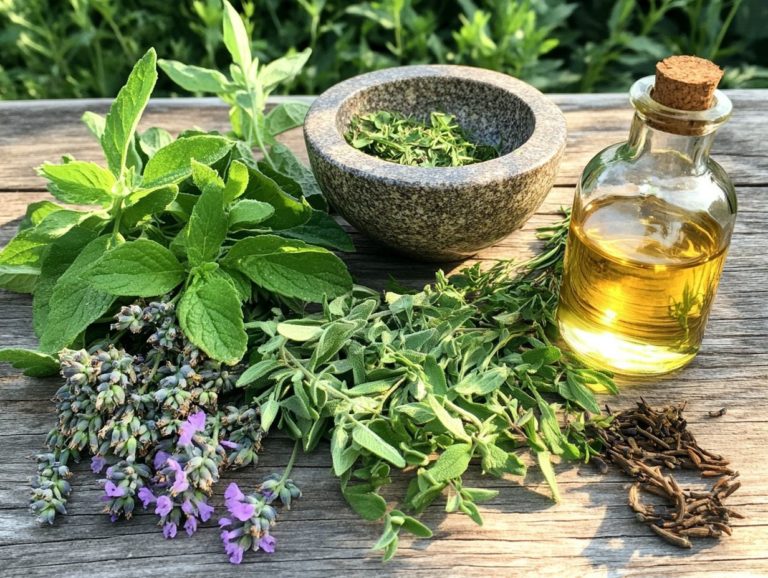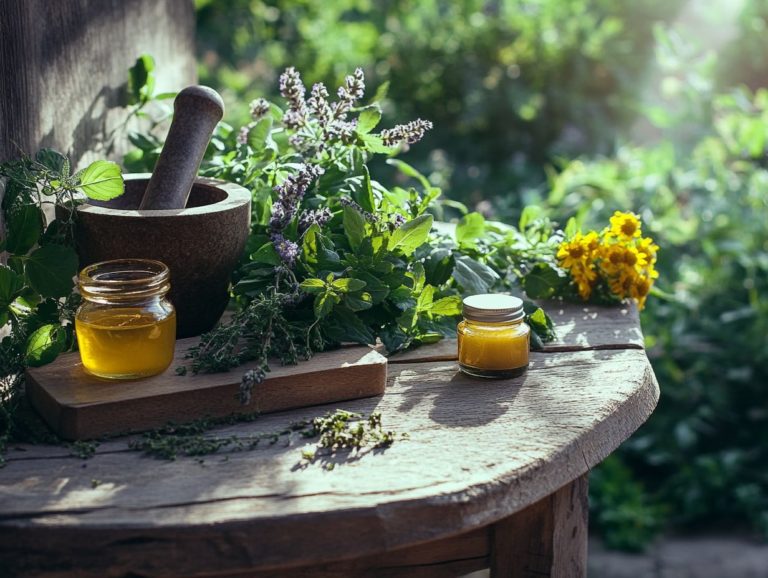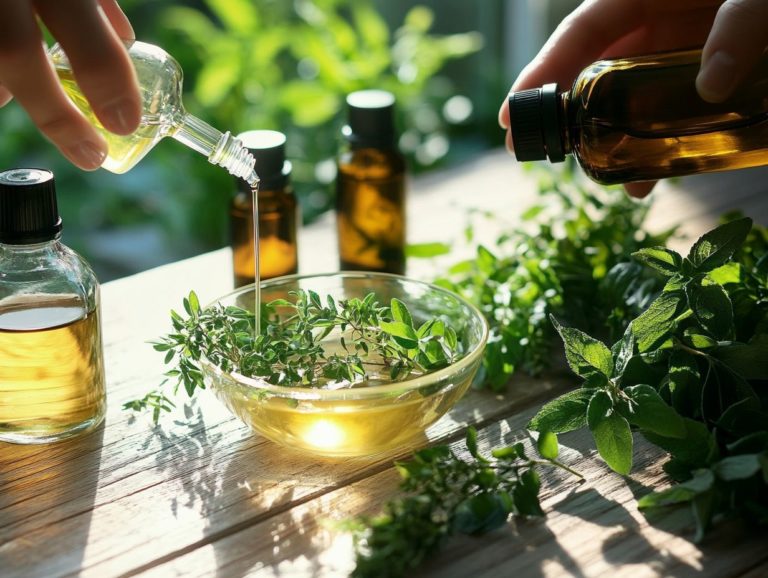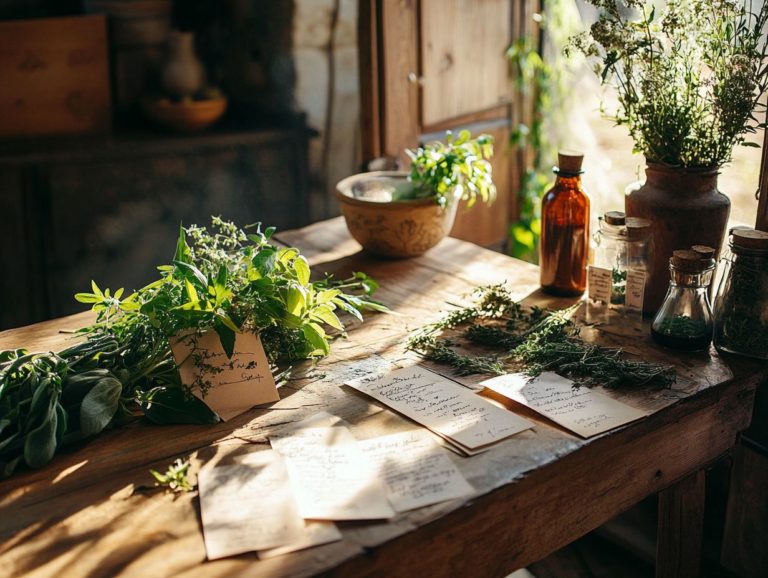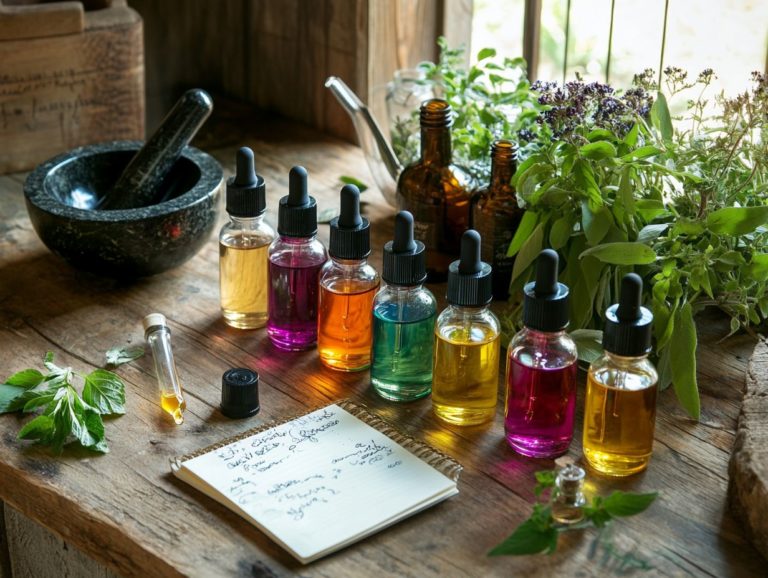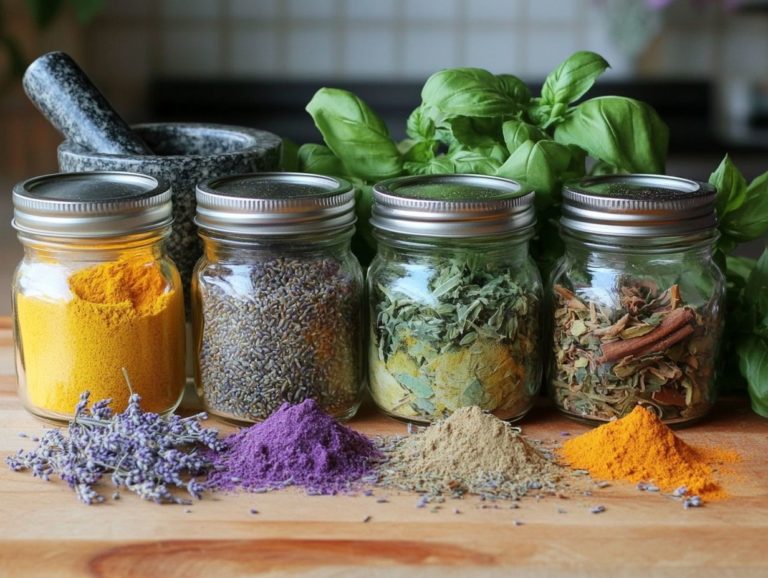How to Make a Herbal Infusion for Relaxation
Herbal infusions offer a delightful pathway to unwind, allowing you to embrace the calming benefits of nature through various herbal remedies.
Delve into the world of herbal infusions, uncovering their countless advantages and gaining insights on how to select the perfect herbal teas for your needs.
You ll find a straightforward, step-by-step guide to preparing your infusion, showcasing the best herbs for ultimate relaxation and health benefits.
Get ready to brew your way to pure relaxation with these delightful herbal drinks!
You can also discover other uses for these soothing brews, such as homemade cosmetics and herbal tinctures, along with expert tips to ensure your infusion turns out flawlessly.
Contents
- Key Takeaways:
- What is a Herbal Infusion?
- Choosing the Right Herbs
- Preparing the Infusion
- Best Herbs for Relaxation
- Other Uses for Herbal Infusions
- Tips for Making the Perfect Infusion
- Frequently Asked Questions
- What ingredients should I use to make a herbal infusion for relaxation?
- How do I prepare the herbs for the infusion?
- What is the best way to steep the herbs for maximum relaxation benefits?
- Can I add other ingredients to my herbal infusion for relaxation?
- What is the recommended dosage for a herbal infusion for relaxation?
- Can I use a tea strainer for my herbal infusion?
Key Takeaways:
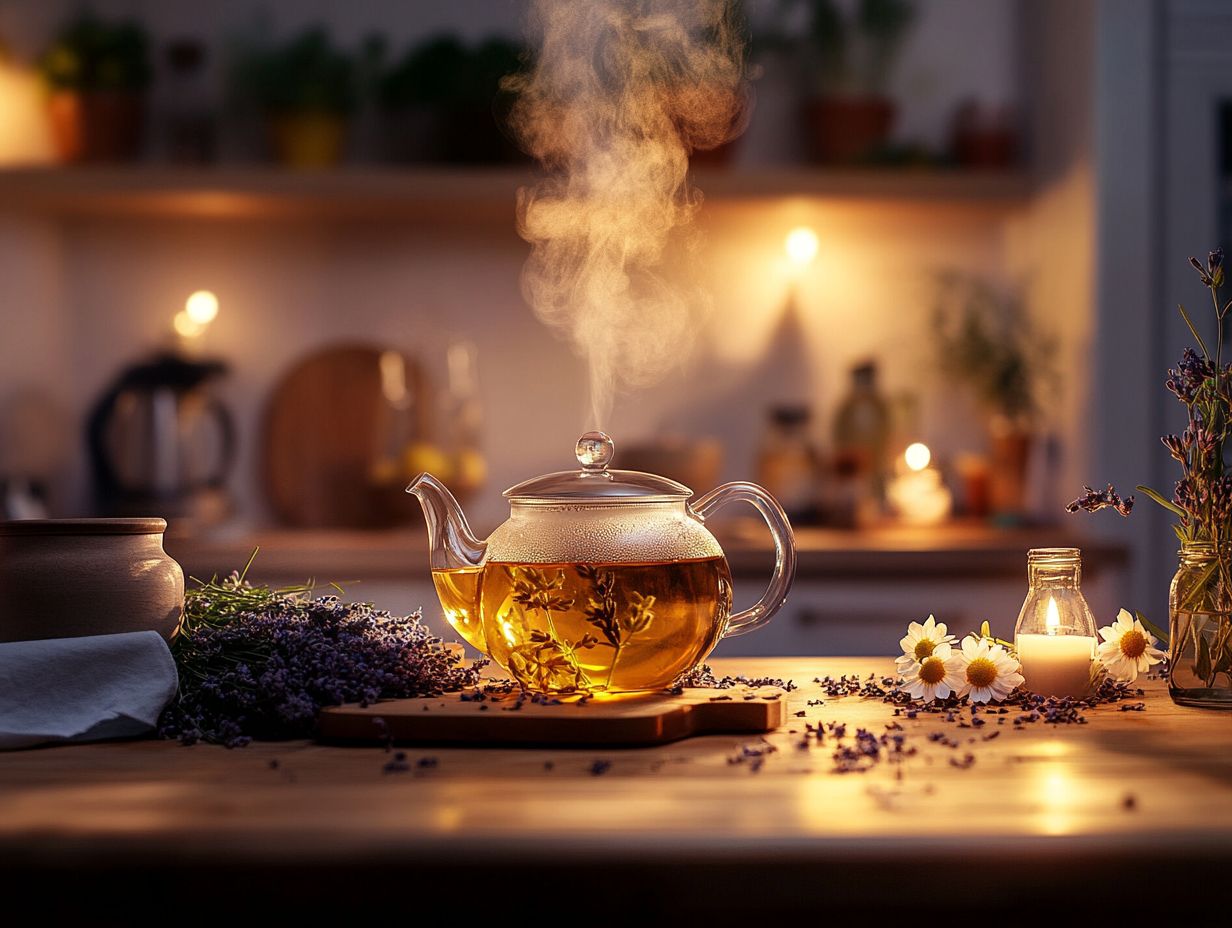
- Unlock the relaxing powers of herbal infusions and boost your well-being!
- Learn how to choose the right herbs for your infusion based on flavor, potency, and desired effects.
- Follow a step-by-step guide to preparing the perfect herbal infusion and explore other uses beyond relaxation, such as medicinal and culinary applications.
What is a Herbal Infusion?
Herbal infusions offer a delightful means to harness the medicinal properties of fresh herbs, resulting in flavorful teas that provide comfort while promoting holistic health.
This time-honored practice transforms an array of botanical ingredients into soothing beverages. These beverages can alleviate specific ailments, enhance digestion, and serve as effective herbal remedies.
By steeping vibrant leaves in hot water, you open the door to a realm of health benefits. This makes herbal infusions a critical aspect of herbal medicine and a cornerstone of healthy living.
Definition and Benefits
Herbal infusions are your gateway to natural extractions that come to life by steeping herbs in hot water. This creates a drink that s brimming with flavor and a wealth of health benefits.
These delightful brews offer not just a moment of tranquility but also numerous advantages, including soothing digestion, which supports your overall well-being.
Take chamomile as an example; its calming effects can ease stress and enhance sleep quality, making it the perfect companion when you seek relaxation.
Similarly, peppermint is renowned for its soothing properties, effortlessly alleviating digestive discomfort, bloating, and nausea. And let s not overlook ginger, a warming powerhouse that aids digestion and boosts your immune system.
Collectively, these soothing infusions serve as effective herbal remedies, making them invaluable allies in your health-conscious lifestyle and a vital part of traditional medicine.
Choosing the Right Herbs
Selecting the right herbs for your herbal infusion is crucial for unlocking their full health benefits, especially when you’re targeting specific ailments or aiming to boost your overall wellness with herbal blends.
Fresh, seasonal herbs not only enhance the flavor of your herbal tea blend but also elevate its effectiveness, providing you with a personalized approach to health and wellness.
By familiarizing yourself with the medicinal properties of various herbs like peppermint for digestion, chamomile for relaxation, and ginger for inflammation you can craft bespoke herbal blends that perfectly align with your unique needs.
Factors to Consider
When selecting herbs for your infusion, consider several key factors to ensure a beneficial outcome that aligns perfectly with your health goals.
Understanding the unique properties of each herb is crucial, as their therapeutic potential can vary significantly. Some herbs may provide excellent relief for digestive issues, while others excel at alleviating stress or supporting your immune system. Additionally, fresh herbs can elevate both flavor and potency; fresher plants tend to retain more essential oils and nutrients than their dried counterparts.
Exploring the benefits of herbal blends can provide a wider range of support. Combining the properties of multiple herbs allows you to address various ailments in a more holistic way. Choosing the right combination will enhance your experience, making it more fulfilling and health-boosting through the use of herbal teas.
Preparing the Infusion
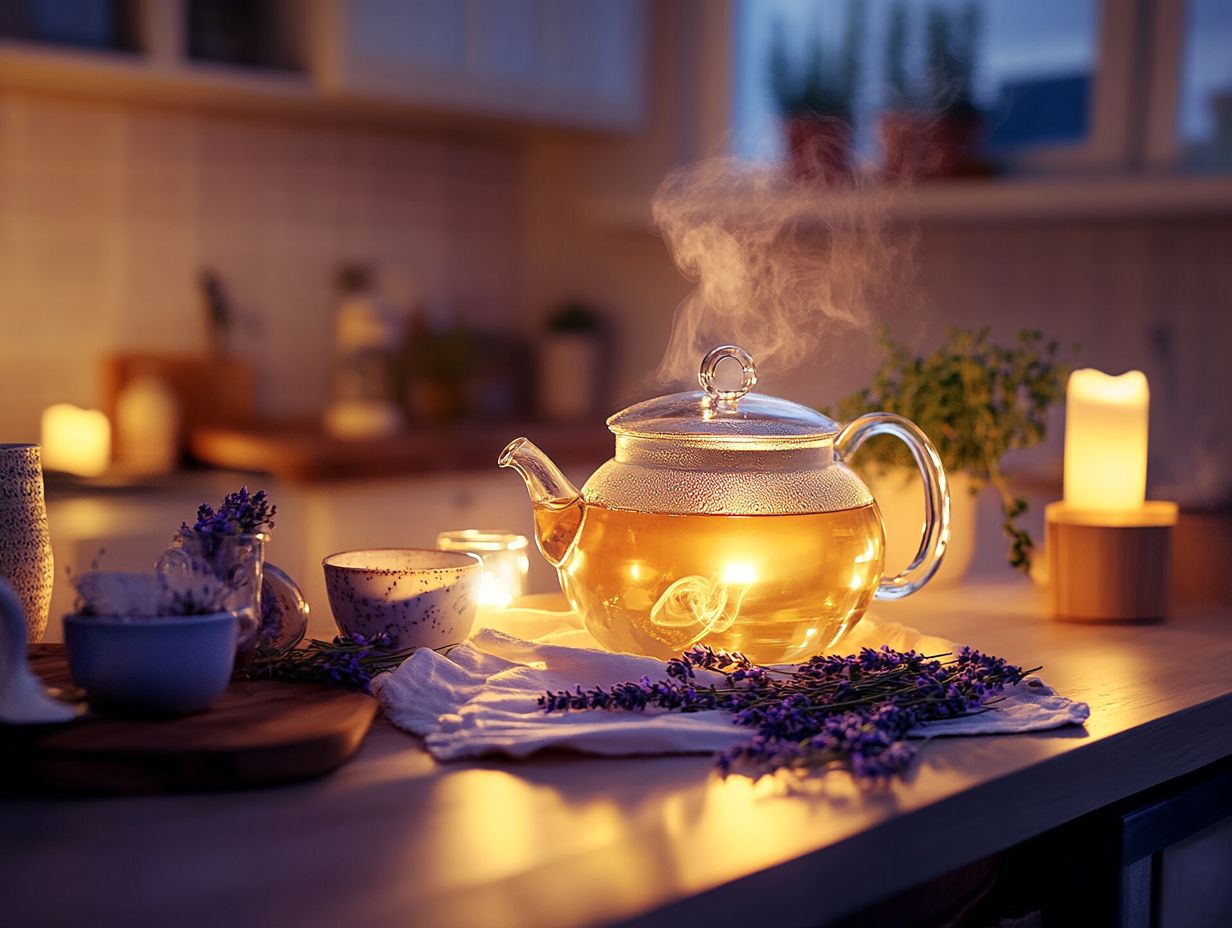
Preparing a herbal infusion requires careful attention to ensure you extract the full medicinal value of the herbs through skilled tea-making methods.
This process can be approached with various methods, such as the decoction method, a way of boiling herbs to release their benefits, and infusion recipes that incorporate seasonal herbs tailored to different tastes and health benefits. For a delightful experience, consider trying 5 herbal tea recipes for a relaxing evening. By mastering these techniques, you can craft nourishing herbal infusions that serve as both comforting beverages and effective herbal preparations to enhance your overall well-being.
Step-by-Step Guide
To craft a delightful herbal infusion, follow this guide that highlights the significance of using fresh leaves in your herbal tea blend and understanding the unique properties of each herb.
Selecting the right herbs is essential. Consider choosing chamomile tea for soothing relaxation or peppermint tea for a refreshing zing. For additional options, explore herbal tea for stress relief. Gather fresh herbs or high-quality dried options, ensuring they are free from additives. Once you’ve made your selection, gently bruise the leaves to release their aromatic essential oils.
Next, heat the water to just below boiling, around 200 F, for optimal extraction. This ensures the flavors of your herbal infusions are at their best. Add your chosen herbs to the hot water and steep for about 5 to 15 minutes, allowing the herbal properties to fully infuse. For the finest flavor and health benefits, cover the infusion while it steeps to enhance its aromatic qualities and therapeutic effects. To learn more about the process, check out this guide on how to brew herbal tea with loose leaves.
Finally, enjoy your herbal infusion in a cozy cup. Consider enhancing it with a slice of lemon or a drizzle of honey to elevate the natural flavors.
Best Herbs for Relaxation
Let s dive into the world of herbal teas! Certain herbs truly shine for their calming effects, making them exquisite choices for herbal infusions aimed at alleviating stress and anxiety. Remedies like chamomile tea, peppermint, and lemon balm have long been revered for their ability to soothe both mind and body, providing a comforting experience in each sip that contributes to herbal health.
By choosing these tranquil teas for your herbal infusion, you can craft a soothing ritual that elevates your relaxation and nurtures your overall well-being through herbal bath recipes for relaxation.
Top Picks for Stress Relief
If you’re looking for effective herbal remedies to help relieve stress, calming teas like peppermint and chamomile should be at the top of your list. These teas are not just beloved for their smooth flavors; they also offer special properties that promote relaxation and tranquility, which can greatly enhance your wellness routine.
Peppermint, known for its refreshing aroma, can clear the mind and ease tension. It’s an ideal choice for a soothing evening sip. Chamomile, praised for its mild sedative effects, is widely brewed to help with anxiety and disturbed sleep, making it a go-to in herbal preparations. For those looking to enhance their tea experience, consider exploring the 5 best herbs for calming herbal teas.
Making these infusions is simple; just steep the dried herbs in hot water for about five minutes. You’ll have a cozy beverage that can be sweetened with honey or brightened with a slice of lemon, enhancing the tea’s floral notes. By incorporating these drinks into your daily routine, you create a cherished ritual that allows you to unwind, carving out moments of serenity amidst life’s chaos. For those interested in deepening their herbal experience, check out these simple steps to create herbal-infused oils.
Other Uses for Herbal Infusions
Herbal infusions do more than just promote relaxation; they can be used in a variety of ways. They easily blend into both culinary delights and medicinal practices, enhancing your overall well-being.
Beyond Relaxation: Medicinal and Culinary Applications
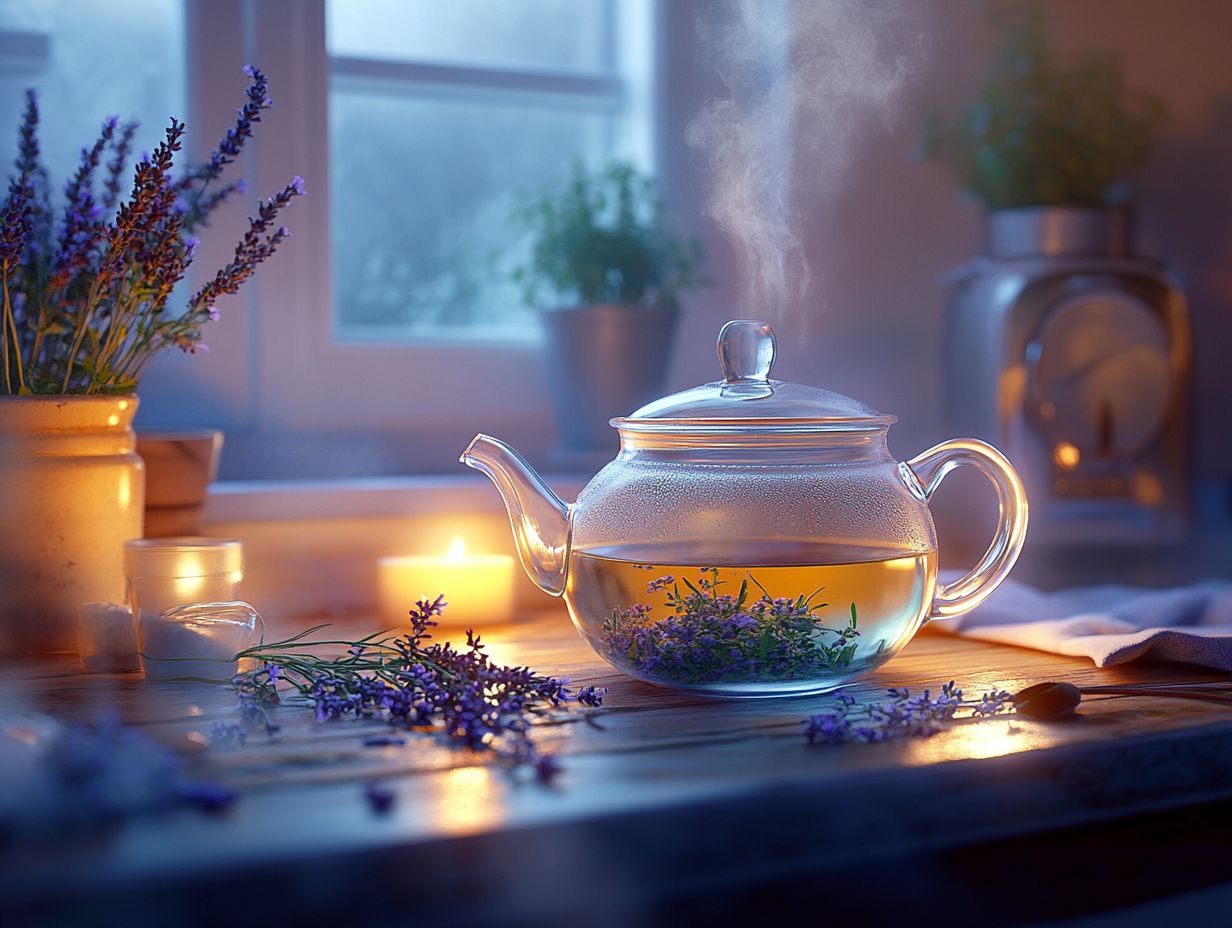
Herbal infusions are versatile ingredients in both the culinary and medicinal fields. They can transform ordinary recipes into healthy drinks and nourishing infusions that benefit your health.
By adding these flavorful brews to your cooking, you enhance both the taste and nutritional value of your dishes. For instance, a refreshing chamomile infusion makes a lovely base for a salad dressing, blending beautifully with fresh greens and nuts. A robust ginger infusion enhances stir-fried vegetables and aids digestion.
When it comes to beverages, herbal infusions like invigorating peppermint tea or zesty hibiscus can be enjoyed hot or iced. They turn simple thirst-quenchers into vibrant drinks rich in antioxidants and calming qualities. These creative uses show how herbal infusions beautifully connect culinary pleasure and well-being.
Tips for Making the Perfect Infusion
To create the perfect herbal infusion, follow a few essential tips that guide you toward optimal results and help you fully enjoy the benefits of your selected ingredients.
Expert Advice for Optimal Results
For the best results in your herbal infusion efforts, expert advice provides valuable insights into tea preparation and the unique benefits of different herbs.
Understanding what each herb brings is vital for crafting soothing infusions. Different plants offer various effects, so it’s helpful to start with a balanced ratio of about one teaspoon of dried herbs for every cup of water. You can adjust this based on your taste and desired strength. The infusion method also matters; steeping herbs in hot water for a longer time allows for a richer extraction of flavors and benefits. If you’re looking to explore further, check out this guide on how to make your own herbal tea at home.
To keep your herbs fresh and effective, store them in airtight containers away from light and moisture. This ensures that every brew brings out their full range of benefits.
Frequently Asked Questions
What ingredients should I use to make a herbal infusion for relaxation?
You can choose from a variety of dried herbs such as chamomile, lavender, lemon balm, and passionflower. Look for herbs with calming properties that are safe to consume. Each of these herbs can be brewed in hot water to create a soothing drink.
If you’re inspired, why not try making your own herbal infusion today? Explore the delightful world of herbal teas and consider using herbs for relieving stress-induced tension to enhance your experience. Share your experiences with friends!
How do I prepare the herbs for the infusion?
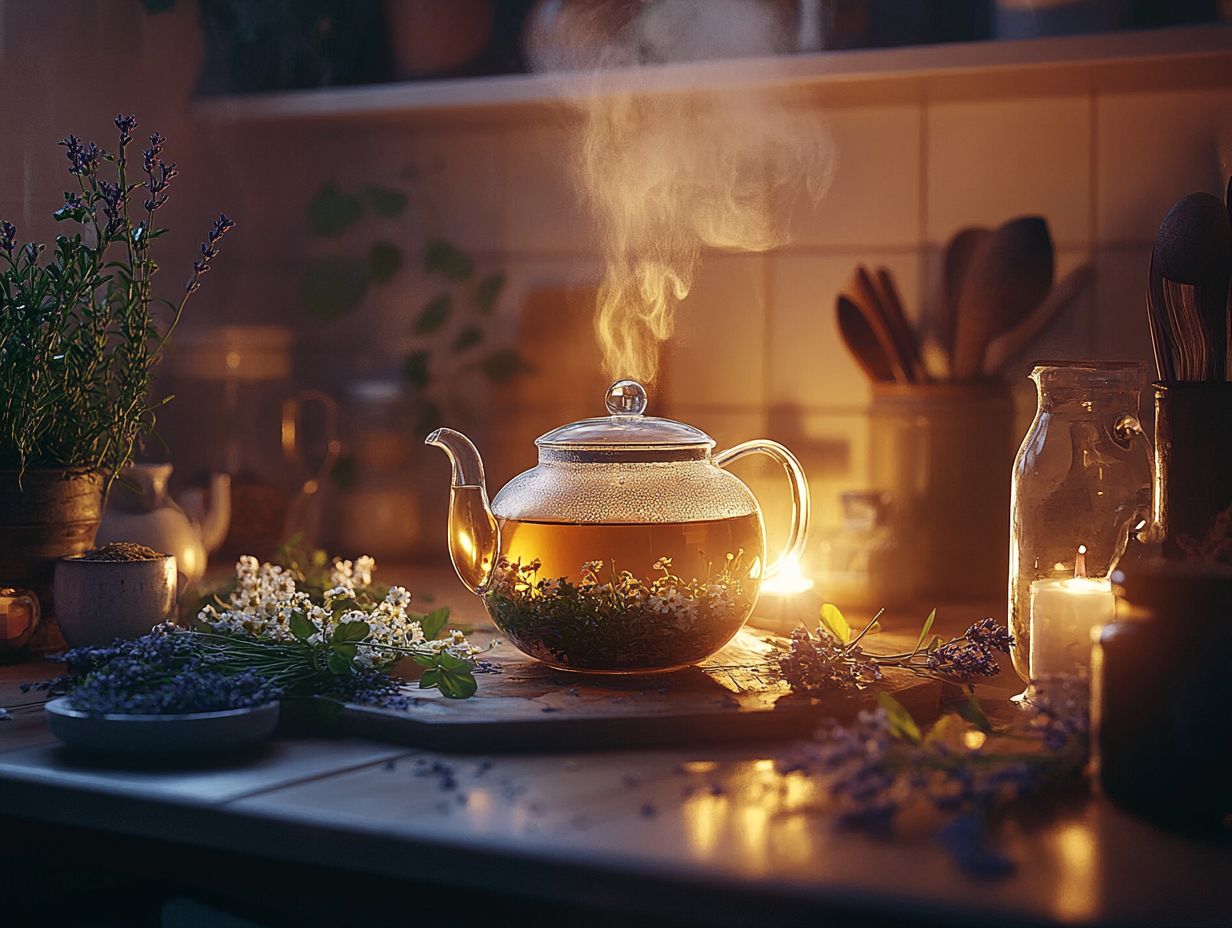
You can use fresh or dried herbs for the infusion. For fresh herbs, chop them into small pieces to release their oils.
If you are using dried herbs, crush them slightly to enhance their flavor. A mortar and pestle works well for this.
What is the best way to steep the herbs for maximum relaxation benefits?
Pour boiling water over the herbs and let them steep for 5-10 minutes. Cover the container with a lid or plate to trap the steam and aroma.
Can I add other ingredients to my herbal infusion for relaxation?
You can add a touch of honey for sweetness or a slice of lemon for a refreshing twist. Feel free to experiment with other herbs and spices like peppermint, ginger, or cinnamon for added flavor and health benefits.
What is the recommended dosage for a herbal infusion for relaxation?
It’s best to follow the instructions on the herb packaging or consult a herbalist for recommended dosages. As a general rule, use 1-2 teaspoons of dried herbs for every cup of water.
However, it’s always better to start with a smaller amount and adjust according to your preference.
Can I use a tea strainer for my herbal infusion?
Yes! A tea strainer or small mesh sieve is perfect for straining herbs from your infusion. This ensures you enjoy a smooth, clear drink every time!

